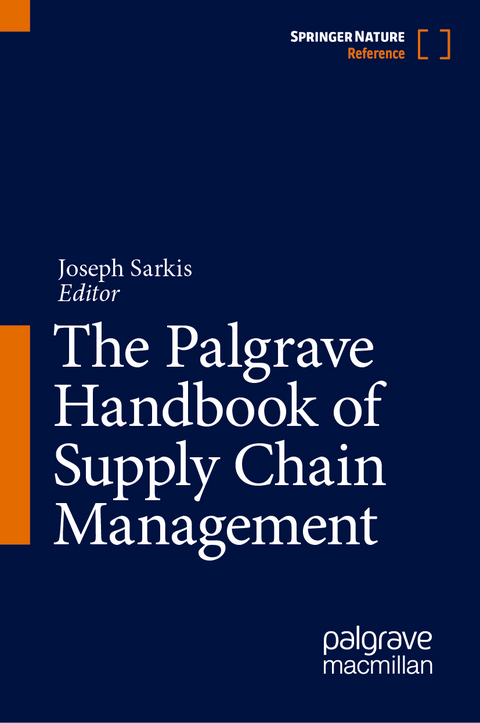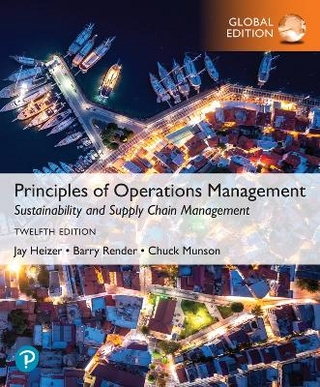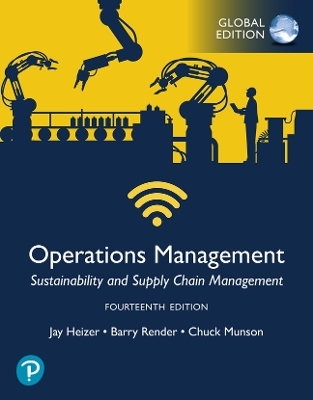
The Palgrave Handbook of Supply Chain Management
Springer International Publishing
978-3-031-19883-0 (ISBN)
This handbook offers a comprehensive presentation of the field of supply chain management. Divided into six sections, it addresses broad strategic issues, then focuses in on specific locations and technology issues along the supply chain.
The chapters explore topics related to upstream supply chain management, organizational operations and management of supply chains, downstream supply chain management, transportation and logistics management, with strategic, technology, economic, and operational dimensions also covered. Further, the book includes cross-cutting concerns relating to issues such as sustainability, performance management, financial concerns, resilience, and inventory management.
Each chapter presents background on the topics, examines the current concerns of interest to practitioners and researchers, identifies future directions of research, and addresses the managerial implications related to the topic
With chapters writtenin an accessible, easy-to-grasp style, this work will serve as a go-to reference for academics, students, and practitioners alike.Joseph Sarkis is Professor of Management, former Head of Department of Management, and former Interim Dean within Worcester Polytechnic Institute’s (WPI) Business School. His teaching and research interests include topics in Supply Chain Management, Business and the Natural Environment, Sustainability, Operations, Logistics, Technology, and Information Management. He has also taught courses on topics in Supply Chain Management, Logistics, Operations Management, Business Analytics, Management Science, Sustainability, Business and the Natural Environment. He has published over 350 papers in peer reviewed journals on topics ranging from transportation and supply chains to manufacturing and production technology to service, non-profit and governmental settings, with the vast majority of publications in SSI/SSCI indexed journals. He has also published over 175 additional papers as chapters in books and in conference proceedings. Twelve of his books have been published. A number of his publications have been recognized with various publishing awards. His work has been cited over tens of thousands of times based on Google Scholar citations, with an H-index above 125. Dr. Sarkis is noted as the world’s most productive scholar between 1995-2015 in the field of supply chain management. He is recognized as one of the most highly cited scholars in the world by the Web-of-Science (Clarivate) for a number of years starting in 2016 until today; this recognition has been noted by Clarivate the world’s “most influential scientific minds.” Currently, he serves on a number of editorial boards for a broad variety of journals including sustainability, operations and manufacturing, technology management, production, and information systems journals. He has served as editor of IEEE Engineering Management Review and Management Research Review. Prof. Sarkis’s departmental and associate editor duties include and have included the Models and Methodologies department and the Social Issues and Sustainability in Engineering Management department for IEEE Transactions on Engineering Management; Resources, Conservation and Recycling, the Journal of Supply Chain Management, and Transportation Research Part E. Dr. Sarkis has served as Guest Editor of dozens of special issues on Technology, Transportation, Innovation, Sustainability and Business topics in such journals as the European Journal of Operational Research, Decision Sciences, Journal of Cleaner Production, Business Strategy and the Environment, Transportation Research E, International Journal of Operations and Production Management, International Journal of Production Economics, Greener Management International, and Information Systems Frontiers. His dozen books include topics on Greening the Supply Chain and Strategic Sustainability. Joseph's most recent books include edited volumes entitled Greening Logistics and Transportation and Green Growth: Managing the Transition to a Sustainable Economy. His most current book is Green Supply Chain Management, published with Yijie Dou and the Handbook of Sustainable Supply Chains. He is a book series editor for the Greening of Industry Networks series. He has served as a visiting scholar at various international locations including Cardiff University’s BRASS center and Business School, the University of Oviedo in Spain, Hanken School of Economics in Helsinki, UCSI University in Kuala Lumpur, and a visiting Scholar in the EU Erasmus Mondus MESPOM program. He has also been a Sea-Sky Scholar at Dalian University of Technology in China. He is an AT&T Industrial Ecology Fellow. He has given lectures and keynote addresses in a number of countries including Denmark, Egypt, Finland, France, Germany, Hungary, Lebanon, Sweden, Italy, Japan, China, Brazil, the UK and the Philippines. He is the holder of the TEC-LOGd Chair d’Excellence for Transport, Circular Economy and Sustainable Supply Chains at the Université Polytechnique Hauts-de-France.
Strategic Planning.- Horizontal Integration.- Coopetition.- Vertical Integration.- Finance Network Design.- New Product Development.- Product Life Cycles.- Social Concerns.- Gender Diversity.- Supplier Diversity.- Supplier Social Justice.- Sustainability.- Circular Economy.- Humanitarian Supply Chains.- Modern slavery.
| Erscheint lt. Verlag | 2.2.2024 |
|---|---|
| Zusatzinfo | XXV, 1533 p. 155 illus., 95 illus. in color. In 2 volumes, not available separately. |
| Verlagsort | Cham |
| Sprache | englisch |
| Maße | 155 x 235 mm |
| Gewicht | 2692 g |
| Themenwelt | Wirtschaft ► Betriebswirtschaft / Management ► Logistik / Produktion |
| Schlagworte | Distribution • logistics • operations • procurement • purchasing • Strategy • Technology • Transportation Management |
| ISBN-10 | 3-031-19883-2 / 3031198832 |
| ISBN-13 | 978-3-031-19883-0 / 9783031198830 |
| Zustand | Neuware |
| Haben Sie eine Frage zum Produkt? |
aus dem Bereich


